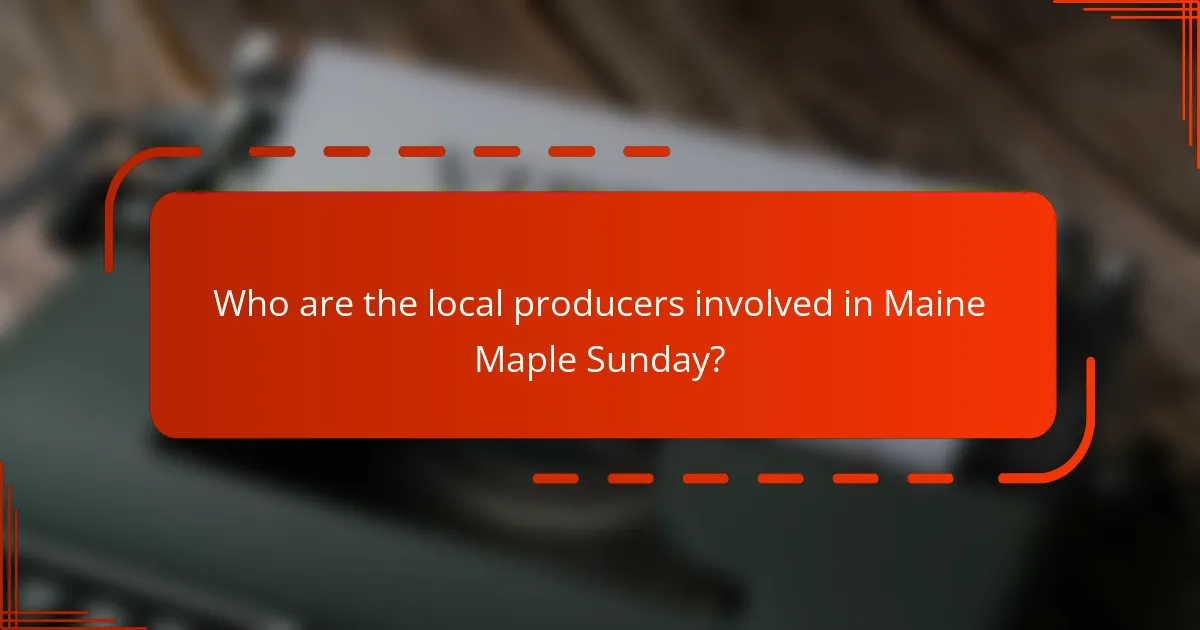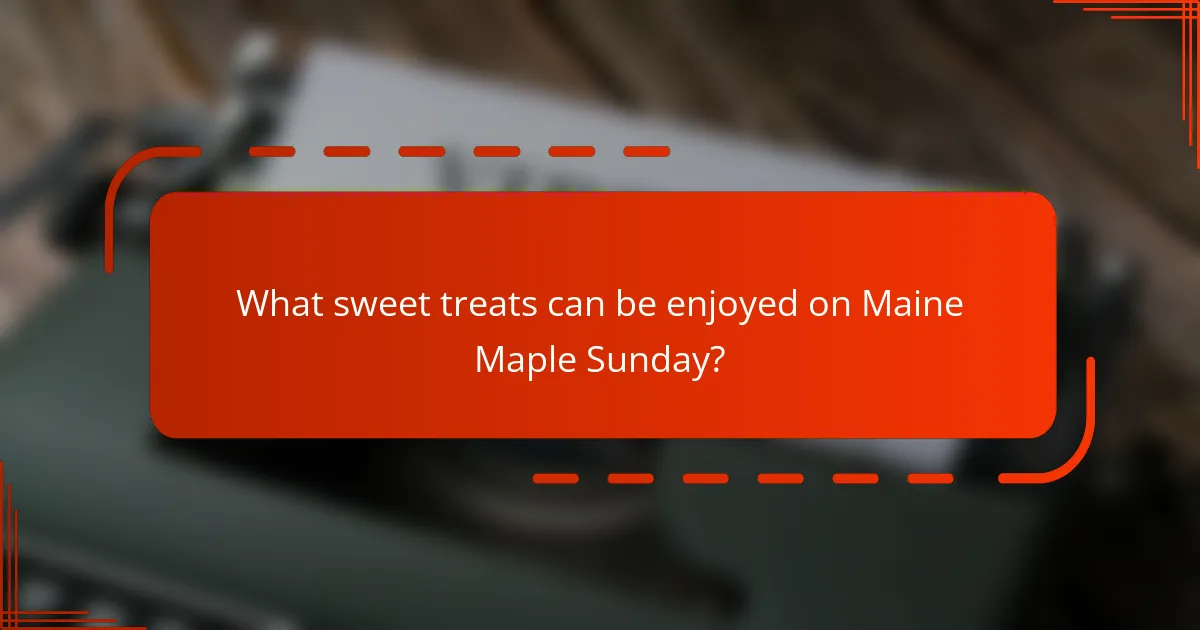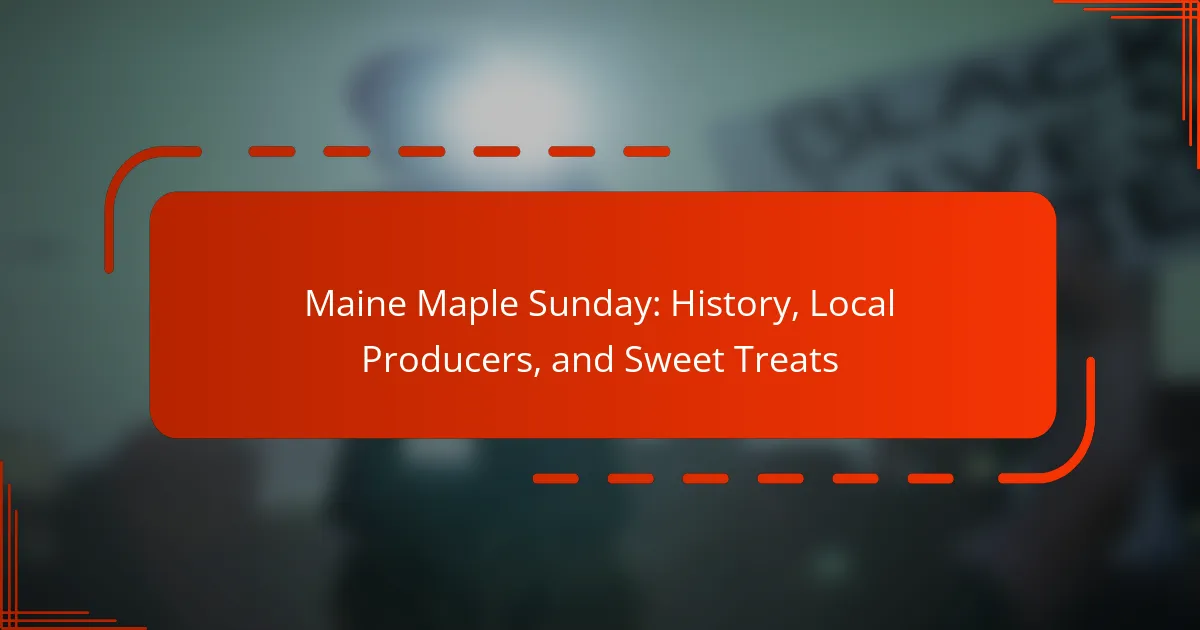Maine Maple Sunday is an annual event held on the fourth Sunday of March, celebrating the maple syrup industry in Maine. During this event, various sugarhouses throughout the state open to the public, offering tours and free samples of maple syrup and related products. Established in 2007, Maine Maple Sunday promotes local producers and highlights the importance of maple syrup to Maine’s economy and agricultural heritage. Visitors can enjoy a variety of sweet treats, including maple syrup on pancakes, maple cotton candy, and baked goods featuring local maple products. The event attracts thousands of attendees each year, showcasing the community spirit and rich traditions of Maine’s maple syrup production.

What is Maine Maple Sunday?
Maine Maple Sunday is an annual event celebrating the maple syrup industry in Maine. It occurs on the fourth Sunday of March. During this day, sugarhouses across the state open their doors to the public. Visitors can observe the maple syrup production process. Many sugarhouses offer free samples of syrup and related products. The event promotes local producers and the significance of maple syrup in Maine’s economy. Established in 2007, it has grown in popularity, attracting thousands of visitors each year. Maine Maple Sunday highlights the state’s rich agricultural heritage and community spirit.
How did Maine Maple Sunday originate?
Maine Maple Sunday originated in 1983 as a way to promote the state’s maple syrup industry. The event was established by the Maine Maple Producers Association. It encourages syrup producers to open their sugarhouses to the public. Visitors can learn about the syrup-making process and sample products. The event typically takes place on the last Sunday of March. It has grown in popularity, attracting thousands of visitors each year. Maine Maple Sunday showcases the state’s agricultural heritage and local businesses. The event highlights the importance of maple syrup production in Maine’s economy.
What historical events led to the establishment of Maine Maple Sunday?
Maine Maple Sunday was established in 2000 to promote the state’s maple syrup industry. The event was created in response to the need for increased awareness of local maple producers. Prior to its inception, Maine’s maple syrup production faced challenges due to competition from other states. The Maine Maple Producers Association initiated the event to encourage tourism and local sales. The first Maine Maple Sunday featured sugarhouses opening their doors to the public. Visitors could taste syrup and learn about the syrup-making process. This initiative successfully highlighted Maine’s rich maple syrup heritage. The event has grown in popularity, celebrating the state’s agricultural traditions.
Who were the key figures involved in its inception?
Maine Maple Sunday was initiated by local maple syrup producers. Key figures included members of the Maine Maple Producers Association. They sought to promote the state’s maple syrup industry. The event began in 2000 as a way to celebrate maple syrup production. It has since grown in popularity across the state. The involvement of local farmers was crucial for its success. They opened their sugarhouses to the public. This allowed visitors to learn about the syrup-making process firsthand.
What are the main activities associated with Maine Maple Sunday?
Maine Maple Sunday features various activities centered around maple syrup production. Visitors can tour sugarhouses to observe the syrup-making process. Many farms offer free samples of maple syrup and related products. Educational demonstrations explain tapping techniques and boiling methods. Some locations host live music and family-friendly events. Local vendors often sell crafts and food items. Activities vary by farm, enhancing the community experience. Maine Maple Sunday typically occurs on the last Sunday in March, celebrating the maple syrup harvest.
What types of events can visitors expect on Maine Maple Sunday?
Visitors can expect various events on Maine Maple Sunday. These events include tours of sugarhouses. Participants can observe the maple syrup production process. Many sugarhouses offer tastings of fresh maple syrup. Visitors can also enjoy live demonstrations of syrup-making techniques. Some locations provide family-friendly activities, such as games and crafts. Local vendors often sell maple products and other treats. Many sugarhouses host educational sessions about maple syrup’s history. These events typically occur on the last Sunday in March, celebrating the maple sugaring season in Maine.
How do local producers participate in these events?
Local producers participate in Maine Maple Sunday by opening their sugarhouses to the public. They offer tours to showcase the maple syrup production process. Many producers provide tastings of their syrup and other maple products. This event allows local producers to sell their products directly to consumers. Participation promotes local agriculture and strengthens community ties. In 2023, over 100 sugarhouses across Maine participated, drawing thousands of visitors. This engagement highlights the importance of local producers in the state’s economy and culture.

Who are the local producers involved in Maine Maple Sunday?
Local producers involved in Maine Maple Sunday include various sugarhouses across the state. These producers open their doors to the public for tours and tastings. Notable participants include Maple Hill Farm, which offers demonstrations of the maple syrup production process. Another example is the Maine Maple Producers Association, representing numerous local sugarhouses. Each producer showcases their unique syrup products and local specialties during this event. Maine Maple Sunday occurs on the last Sunday of March annually, promoting local agriculture and maple syrup production.
How do local producers contribute to Maine Maple Sunday?
Local producers contribute to Maine Maple Sunday by opening their sugarhouses to the public. They showcase the maple syrup production process. Visitors can observe sap collection and boiling. Many producers offer tastings of fresh maple syrup. Some provide demonstrations of traditional maple sugaring techniques. Local producers also sell their products directly to consumers. This event fosters community engagement and supports local economies. Maine Maple Sunday typically occurs on the last Sunday in March. In 2023, over 100 sugarhouses participated, attracting thousands of visitors.
What unique products do local producers offer during the event?
Local producers offer unique maple syrup products during Maine Maple Sunday. These products include various grades of maple syrup, such as light, medium, and dark. Producers also provide maple candy, which is a sweet treat made from pure maple syrup. Additionally, some vendors sell maple cream, a spreadable form of syrup. Unique items like maple-infused sauces and marinades are also available. Many producers showcase specialty products like maple-flavored baked goods. Some offer educational experiences about syrup production. These offerings highlight the diverse uses of maple syrup in local cuisine.
How do local producers promote their maple products?
Local producers promote their maple products through various marketing strategies. They often participate in events like Maine Maple Sunday to engage with consumers directly. These events allow producers to showcase their products and educate visitors about the maple syrup production process. Social media platforms are also utilized to reach a wider audience. Producers share recipes, product information, and stories about their farms online. Collaborations with local restaurants and retailers help increase product visibility. Additionally, some producers offer tours and tastings at their sugarhouses. This hands-on experience fosters a personal connection with consumers. Promotional materials, such as brochures and signage, highlight product quality and unique attributes.
What are the benefits of supporting local producers on Maine Maple Sunday?
Supporting local producers on Maine Maple Sunday boosts the local economy. When consumers purchase maple products from local producers, they contribute directly to the livelihoods of farmers and artisans. This spending helps maintain jobs in the community. It also promotes sustainable agricultural practices, as local producers often prioritize environmentally friendly methods. Additionally, supporting local businesses fosters a sense of community and strengthens local relationships. According to the Maine Maple Producers Association, local purchases keep more money circulating within the community. This results in a healthier economy overall. Consumers also gain access to fresher, high-quality products that reflect the region’s unique flavors.
How does buying local maple products impact the community?
Buying local maple products positively impacts the community by supporting local economies. When consumers purchase these products, they directly contribute to the livelihoods of local farmers and producers. This creates jobs and stimulates economic growth in the region.
Additionally, buying local maple products fosters community relationships. It encourages consumers to engage with local businesses and understand their practices. This connection can lead to increased trust and collaboration within the community.
Local maple production also promotes sustainable practices. Many producers focus on environmentally friendly methods, which benefits the ecosystem. A study by the University of Maine found that local maple syrup production can enhance biodiversity and soil health.
Furthermore, purchasing local maple products can boost tourism. Events like Maine Maple Sunday attract visitors, generating additional revenue for the community. This influx of tourists can help local businesses thrive.
In summary, buying local maple products strengthens the economy, builds community ties, promotes sustainability, and enhances tourism.
Why is it important to support sustainable practices among local producers?
Supporting sustainable practices among local producers is important for environmental preservation and economic resilience. Sustainable practices reduce the carbon footprint associated with food production. They promote biodiversity and protect ecosystems. Local producers often utilize methods that minimize chemical use and enhance soil health. This leads to healthier food options for consumers. Additionally, supporting local producers strengthens community ties and keeps money within the local economy. According to a study by the American Farmland Trust, local food systems can generate up to four times the economic impact compared to non-local systems. Thus, supporting sustainable practices fosters a healthier environment and a robust local economy.

What sweet treats can be enjoyed on Maine Maple Sunday?
On Maine Maple Sunday, visitors can enjoy a variety of sweet treats. These include maple syrup poured over pancakes and waffles. Maple cotton candy is also a popular choice. Many local producers offer maple candies and confections. Attendees often sample maple cream and maple butter. Some farms serve maple-flavored baked goods, such as cookies and pies. These treats highlight the local maple syrup production. Maine Maple Sunday celebrates the sweet flavors of spring.
What are the most popular maple-based treats available?
The most popular maple-based treats include maple syrup, maple candy, and maple cream. Maple syrup is a staple, often used as a sweetener for pancakes and waffles. It is produced by boiling down the sap from sugar maple trees. Maple candy, also known as maple sugar, is made by boiling maple syrup until it reaches a specific temperature, then cooling it to form a solid treat. Maple cream is a spreadable version of maple sugar, created by whipping maple syrup while it cools. These treats are widely enjoyed during Maine Maple Sunday events, showcasing local producers and their products.
How are these treats made using local maple syrup?
Local maple syrup treats are made by incorporating syrup into recipes for various confections. The process begins with the collection of sap from sugar maple trees. This sap is then boiled down to create maple syrup, which contains natural sugars and flavors.
Once the syrup is ready, it can be used in recipes for treats like maple candy, fudge, or cookies. For example, to make maple candy, syrup is heated to a specific temperature and then cooled to create a solid form. Maple syrup can also be drizzled over pancakes or mixed into baked goods for added flavor.
These treats highlight the unique taste of local maple syrup, celebrated during events like Maine Maple Sunday. This annual event showcases local producers and their products, emphasizing the importance of regional maple syrup production.
What recipes feature maple syrup that visitors can try at home?
Pancakes with maple syrup are a classic recipe that visitors can try at home. This dish combines fluffy pancakes with rich maple syrup for a sweet breakfast. Additionally, maple syrup can be used in baked goods like maple syrup cookies. These cookies have a unique flavor profile thanks to the syrup. Another popular recipe is maple-glazed roasted vegetables. This dish enhances the natural sweetness of vegetables with a maple glaze. Maple syrup can also be incorporated into salad dressings for a sweet twist. Visitors can make a simple vinaigrette using maple syrup, vinegar, and oil. Lastly, maple syrup can be added to oatmeal for a warm, comforting breakfast. Each of these recipes showcases the versatility of maple syrup in various dishes.
How can visitors fully experience Maine Maple Sunday?
Visitors can fully experience Maine Maple Sunday by participating in local sugarhouse tours. Many sugarhouses across Maine open their doors to the public on this day. Visitors can observe the maple syrup production process firsthand. This includes learning how sap is collected and boiled down into syrup.
Sampling fresh maple syrup and maple products is a highlight of the event. Many sugarhouses offer tastings of their unique syrups and treats. Some locations also provide demonstrations and educational sessions.
Visitors should plan their itinerary ahead of time. A map of participating sugarhouses is available through the Maine Maple Producers Association. This ensures an organized and enjoyable experience. Engaging with local producers enhances the connection to Maine’s maple syrup heritage.
What are some tips for planning a visit to Maine Maple Sunday?
Plan your visit to Maine Maple Sunday by checking the event date, which is typically the last Sunday in March. Arrive early to avoid crowds and ensure you have enough time to visit multiple sugarhouses. Research participating sugarhouses in advance, as many offer unique experiences and products. Dress appropriately for the weather, as outdoor activities may be involved. Bring cash, as some vendors may not accept cards. Lastly, consider sampling various maple products, such as syrup, candy, and baked goods, to fully enjoy the event.
What should visitors know about the best times to attend events?
Visitors should know that the best times to attend events like Maine Maple Sunday are typically during the early afternoon. Events often peak in attendance around noon to 2 PM. This timing allows visitors to enjoy the freshest maple products. Many local producers offer tastings and demonstrations during these hours. Additionally, arriving early can help avoid crowds. Checking the weather is also important, as sunny days attract more visitors. Events usually occur on the last Sunday of March, coinciding with the maple syrup season. This seasonal timing enhances the overall experience.
Maine Maple Sunday is an annual event held on the fourth Sunday of March, celebrating the maple syrup industry in Maine. The event allows visitors to tour sugarhouses, observe the syrup production process, and sample various maple products. Established in 2000 by the Maine Maple Producers Association, it promotes local agriculture and showcases the importance of maple syrup in the state’s economy. The article explores the history of Maine Maple Sunday, the participation of local producers, the activities available to visitors, and the benefits of supporting sustainable practices within the community. Additionally, it highlights popular maple-based treats and offers tips for making the most of the event.
